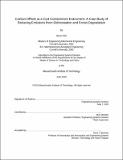Carbon offsets as a cost containment instrument : a case study of reducing emissions from deforestation and forest degradation
Author(s)
Kim, Jieun, S.M. Massachusetts Institute of Technology
DownloadFull printable version (2.298Mb)
Alternative title
Case study of reducing emissions from deforestation and forest degradation
Other Contributors
Massachusetts Institute of Technology. Technology and Policy Program.
Advisor
Mort Webster.
Terms of use
Metadata
Show full item recordAbstract
Carbon offset is one type of flexibility mechanism in greenhouse gas emission trading schemes that helps nations meet their emission commitments at lower costs. Carbon offsets take advantage of lower abatement cost opportunities from unregulated sectors and regions, which can be used to offset the emissions from regulated nations and sectors. Carbon offsets can also meet multiple objectives; for example, the Clean Development Mechanism in the Kyoto Protocol encourages Annex I countries to promote low carbon sustainable projects in developing countries in exchange for carbon offsets. Alternatively, the costs under cap-and-trade policies are subjected to uncertainties due to uncertainties about technology, energy markets, and emissions. There are several cost-containment instruments to address cost uncertainties, such as banking, borrowing, safety valve, and allowance reserves. Although carbon offsets are verified to reduce expected compliance costs by providing a surplus of cheap allowances that can be used by Annex I countries to help meet their commitments, they have yet to be studied as a cost-containment instrument. Carbon offsets could potentially be a cost-containment instrument as purchasing carbon offsets during instances of high carbon price volatility could potentially provide some relief from high prices. This paper analyzes the effect of carbon offsets on carbon prices, specifically under carbon price uncertainty. I use carbon offsets from abatement activities that reduce emissions from deforestation and forest degradation (REDD) as a case study example. My results show that carbon offsets reduce upside costs and thus can be an alternative cost-containment instrument, but cost-effectiveness can be limited by supply uncertainties, offset purchasing restrictions, emission target stringency and competition over demand. Carbon offsets, such as REDD, can serve as a flexibility instrument for developed nations, encourage global participation in reducing GHG emissions, and provide sustainable development support to developing nations.
Description
Thesis (S.M. in Technology and Policy)--Massachusetts Institute of Technology, Engineering Systems Division, Technology and Policy Program, 2010. This electronic version was submitted by the student author. The certified thesis is available in the Institute Archives and Special Collections. Cataloged from student submitted PDF version of thesis. Includes bibliographical references (p. 56-60).
Date issued
2010Department
Massachusetts Institute of Technology. Engineering Systems DivisionPublisher
Massachusetts Institute of Technology
Keywords
Engineering Systems Division., Technology and Policy Program.